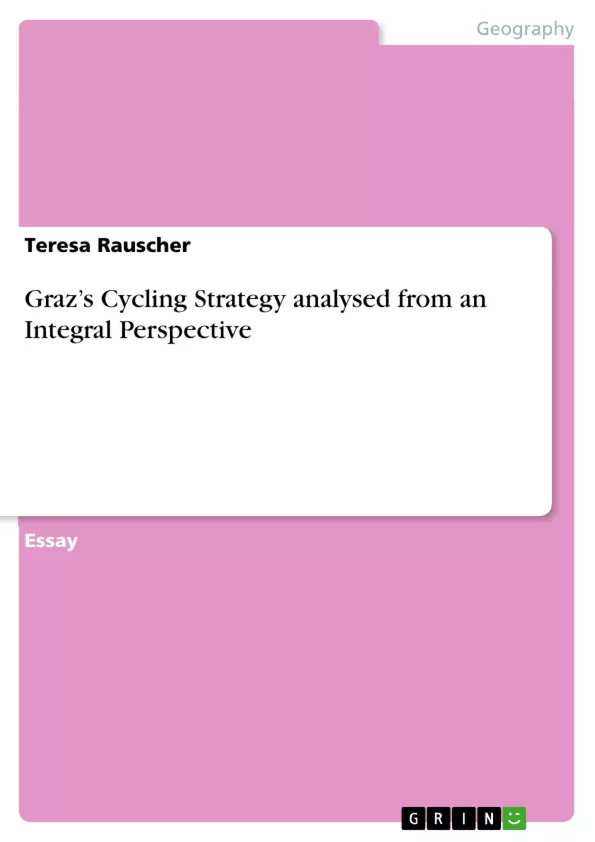This article aims to demonstrate how a sustainable transport strategy can be analysed from an holistic perspective. It utilises the Integral approach to analyse the city of Graz’s cycling strategy paper. The Integral approach aims to ensure that no dimension - mind, behaviour, culture and systems - important to solve sustainability problems is neglected. The analysis of Graz’s cycling SWOT analysis and the 13 targets of the cycling strategy
shows that every dimension is addressed. However, the main activities can clearly be found in the system’s dimension although the strategy aims to change the behavioural and the cultural dimension.
Inhaltsverzeichnis (Table of Contents)
- Introduction
- Definition and Standpoint of Sustainable Transportation
- The Integral Approach
- The Subjective Realm - Change from Within
- The Objective Realm - Change in Behaviour
- The Intersubjective Realm - Change in Culture
- The Interobjective Realm - Change in the System
- Discussion and Conclusions
Zielsetzung und Themenschwerpunkte (Objectives and Key Themes)
This article analyzes Graz's cycling strategy using the Integral approach, a holistic framework that considers four dimensions: mind, behavior, culture, and systems. The main objective is to demonstrate how a sustainable transport strategy can be analyzed from an integral perspective, highlighting the importance of addressing all four dimensions to achieve success. The article focuses on the strengths, weaknesses, opportunities, and threats identified in the SWOT analysis and the 13 targets of the strategy, examining how each dimension is addressed.- Analysis of Graz's cycling strategy through the lens of Integral Theory
- Assessment of the four dimensions (mind, behavior, culture, and systems) in the strategy
- Identification of strengths, weaknesses, opportunities, and threats related to cycling in Graz
- Examination of the 13 targets of the cycling strategy and their alignment with the four dimensions
- Evaluation of the effectiveness of the strategy in addressing all dimensions for sustainable transportation
Zusammenfassung der Kapitel (Chapter Summaries)
- Introduction: This chapter provides an overview of Graz's cycling strategy, highlighting the city's ambition to increase cycling rates and its participation in the EU-funded BICY project. It introduces the 13 targets of the strategy and emphasizes the numerous benefits of cycling for sustainable development.
- Definition and Standpoint of Sustainable Transportation: This chapter clarifies the author's perspective on sustainable transportation, emphasizing the strong sustainability approach and its link to the Integral Theory. It explains the concept of strong sustainability, emphasizing the need to consider the limitations of the biosphere and the interconnectedness of the sociosphere, biosphere, and econosphere.
- The Integral Approach: This chapter introduces the Integral approach, highlighting its holistic framework and its focus on addressing all four dimensions: mind, behavior, culture, and systems. It explains the four-quadrant model and its application in analyzing sustainability problems.
- The Subjective Realm - Change from Within: This chapter focuses on the subjective realm, examining how changes in individual awareness, emotions, and feelings can contribute to sustainable transportation. It discusses the role of awareness raising, education, and addressing cognitive dissonance in achieving behavioral change.
- The Objective Realm - Change in Behaviour: This chapter examines the objective realm, focusing on individual behavior and its influence by the subjective and cultural realms. It analyzes the role of monitoring and evaluation in measuring cycling behavior and identifying factors that influence it.
- The Intersubjective Realm - Change in Culture: This chapter delves into the intersubjective realm, analyzing how cultural norms, values, and shared beliefs influence individual behavior and contribute to sustainable transportation. It explores the role of socialisation, communication, and participation in creating a bicycle culture.
- The Interobjective Realm - Change in the System: This chapter examines the interobjective realm, focusing on changes in the system, such as infrastructure, policies, and regulations. It analyzes Graz's cycling strategy's focus on system changes, highlighting the importance of providing a supportive environment for cycling.
- Discussion and Conclusions: This chapter provides a discussion and conclusions based on the analysis of Graz's cycling strategy. It evaluates the strengths and weaknesses of the strategy in addressing all four dimensions, identifies potential limitations, and discusses the need for a more holistic approach to sustainable transportation.
Schlüsselwörter (Keywords)
This article explores the intersection of sustainable transportation, cycling, and the Integral Theory, examining the city of Graz's cycling strategy through a holistic lens. Key concepts explored include the four dimensions of the Integral approach (mind, behavior, culture, and systems), SWOT analysis, the 13 targets of the cycling strategy, and the challenges of achieving sustainable transportation by addressing all dimensions equally. The article highlights the need for a broader perspective that encompasses individual awareness, cultural shifts, and system changes to effectively promote cycling as a sustainable mode of transportation.Frequently Asked Questions
What is the "Integral approach" used in this analysis?
The Integral approach is a holistic framework that considers four dimensions: mind (subjective), behavior (objective), culture (intersubjective), and systems (interobjective).
What is the main finding regarding Graz's cycling strategy?
While the strategy aims to change behavior and culture, most of its actual activities are focused on the "system" dimension, such as infrastructure and policy.
Why is a holistic perspective important for sustainable transport?
It ensures that no crucial dimension—like individual awareness or social norms—is neglected, which is essential for solving complex sustainability problems.
What does the "subjective realm" refer to in cycling?
It refers to changes from within, such as individual awareness, emotions, and the psychological factors that influence the choice to ride a bike.
How many targets does the Graz cycling strategy have?
The strategy defines 13 specific targets aimed at increasing cycling rates and improving the cycling environment in the city.
What is "strong sustainability" in the context of this study?
It is an approach that emphasizes the absolute limitations of the biosphere and requires that the economy and society operate within these ecological boundaries.
- Citar trabajo
- MSc Teresa Rauscher (Autor), 2012, Graz’s Cycling Strategy analysed from an Integral Perspective, Múnich, GRIN Verlag, https://www.grin.com/document/215888



